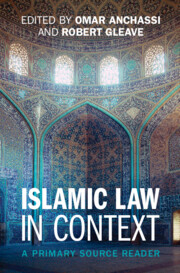Book contents
- Islamic Law in Context
- Islamic Law in Context
- Copyright page
- Contents
- Acknowledgements
- Contributors
- Introduction
- Part I Islamic Legal Theory (Uṣūl al-Fiqh) and Related Genres
- Part II Islamic Jurisprudence (Fiqh) and Related Genres
- Part III Legal Opinions (Fatwās)
- Part IV Court Judgments and Other Court Documentation
- Part V Judicial Manuals and Reference Books
- Part VI Alternative Sources for Islamic Legal Studies
- Chapter 38 Introduction to Part VI
- Chapter 39 Reform of Islamic Law in Nineteenth-Century Afghanistan
- Chapter 40 ‘Permission to Teach’ the Law
- Chapter 41 Controversial and Uncontroversial Biographies in Rayḥānat al-Adab of Mīrzā Muḥammad ʿAlī Mudarris (d. 1373/1954)
- Chapter 42 Battle of the Qāḍīs
- Chapter 43 Aḥlām al-Naṣr and the Islamic State’s Justification for Execution by Burning
- Name Index
- Subject Index
- References
Chapter 42 - Battle of the Qāḍīs
Excerpt from the Novel Sulttānvīṭu by P. A. Muhammad Koya (d. 1990)
from Part VI - Alternative Sources for Islamic Legal Studies
Published online by Cambridge University Press: 14 November 2024
- Islamic Law in Context
- Islamic Law in Context
- Copyright page
- Contents
- Acknowledgements
- Contributors
- Introduction
- Part I Islamic Legal Theory (Uṣūl al-Fiqh) and Related Genres
- Part II Islamic Jurisprudence (Fiqh) and Related Genres
- Part III Legal Opinions (Fatwās)
- Part IV Court Judgments and Other Court Documentation
- Part V Judicial Manuals and Reference Books
- Part VI Alternative Sources for Islamic Legal Studies
- Chapter 38 Introduction to Part VI
- Chapter 39 Reform of Islamic Law in Nineteenth-Century Afghanistan
- Chapter 40 ‘Permission to Teach’ the Law
- Chapter 41 Controversial and Uncontroversial Biographies in Rayḥānat al-Adab of Mīrzā Muḥammad ʿAlī Mudarris (d. 1373/1954)
- Chapter 42 Battle of the Qāḍīs
- Chapter 43 Aḥlām al-Naṣr and the Islamic State’s Justification for Execution by Burning
- Name Index
- Subject Index
- References
Summary
This chapter focuses on two passages from a historical novel in Malayalam, titled Sulttānvīṭu by P. A. Muhammad Koya (d. 1990), set in a Muslim matrilineal household in Calicut on the Malabar coast of southwest India. The first passage deals with a dispute between two groups on the appointment of a judge (qāḍī) and the right to carry out the Friday congregational prayer (in the early 20th century), while the second one involves two public debates in the wake of Wahhābism’s arrival in the region. Broadly speaking, the novel explores the gradual disintegration of the matrilineal tradition among Malabar Muslims in the late 19th and early 20th centuries, at the peak of colonialism, reformism and modernism.
Keywords
- Type
- Chapter
- Information
- Islamic Law in ContextA Primary Source Reader, pp. 434 - 448Publisher: Cambridge University PressPrint publication year: 2024

